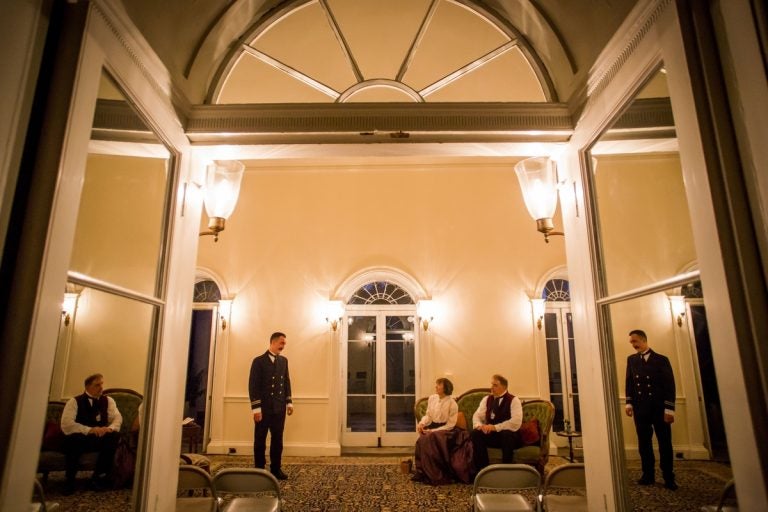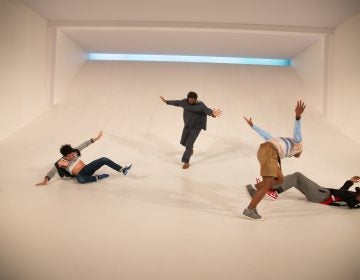Philly Fringe reviews: ‘Mary Rose’ and ‘Eccentricities of a Nightingale’
A play by the creator of Peter Pan, and a rewarding Tennessee Williams work.

Inside The Woodlands manor, in the Philadelphia Artists' Collective production of "Mary Rose," (from left) Adam Hammet, Susan Giddings and John Lopes. (Provided by Philadelphia Artists' Collective)
Mary Rose
The Philadelphia Artists’ Collective is producing the dreamlike play “Mary Rose” in a perfect setting: Inside the stately Woodlands manor in West Philadelphia, and outside on the grounds that include the site’s large 19th-century cemetery. The setting is of the play’s era — it was first staged in 1920, and written by J.M. Barrie 14 years after he made a lasting name for himself with his play about Peter Pan.
The setting works so well because the first and third acts are inside a stately house where the title character grew up. The middle act is outdoors on a tiny island, and this production normally performs it outside. But when I saw the play Wednesday evening, that act unfolded in another room of the mansion because the weather had been wet and remained foreboding. Menacing, too, with limbs down, roads closed and traffic backups that kept me from seeing Act One from the very beginning.
Fortunately, Barrie’s play is classic in form and anyone can catch on quickly. It’s about a young woman named Mary Rose, her strange disappearance as a child, and the way that has marked her, her parents and husband. In order for the play to work it needs a certain weird feel that director Claire Moyer and eight actors provide, seemingly effortlessly and mostly through their timing and quiet, sometimes tense delivery. Barrie’s script keeps tone balanced: The dialogue comes off as quite modern for a work written almost a century back, with characters who can be glib at times.
Philadelphia Artists’ Collective, a team of local theater artists, finds little-known works that often shine once they’re revived. This one, the opening of the stage company’s season and part of the Fringe, doesn’t exactly shine — that would ruin the play’s netherworld effect. Better to think of it as a flower that blooms in the dark, with the childlike and fragile portrayal of Mary Rose by Emily R. Johnson; Susan Giddings and John Lopes as her confounded parents; Adam Hammet as her husband; Chase Byrd as her grown son; and Jahzeer Terrell as a minister who’s been involved in the mystery of Mary Rose’s disappearance. Corinna Burns is a housekeeper and the play’s narrator — especially important here for moving things along — is Anita Holland. Robin I. Shane’s costumes nicely take us to the time just after World War I, and her floor-length white dress for Mary Rose is good enough to fit any playful young woman, or maybe a ghost.
_
“Mary Rose,” produced by Philadelphia Artists’ Collective, runs through Sept. 22 at the Woodlands, 4000 Woodland Ave.
The Eccentricities of a Nightingale
Tennessee Williams was revising his 1948 play “Summer and Smoke” when he turned the reworked script into a new play: “The Eccentricities of a Nightingale.” He didn’t even bother to change some of the characters’ names and they even have the same back stories. Yet “The Eccentricities of a Nightingale“ is its own distinct work. It’s not performed much these days, which is too bad — the Idiopathic Ridiculopathy Consortium makes a great case for seeing it in the company’s first show of the season, part of the Fringe.
This is an airy, often sweet and very funny rendition of Williams’ tightly constructed play, performed in a large room with a cathedral ceiling at Bethany Mission Gallery, which houses the private collection of artifacts and outsider art of Center City attorney-businessman Victor Keen and his wife, dancer-choreographer Jeanne Ruddy. Artistic pieces sit on many shelves and hang from the ceiling, and give the play’s setting, Glorious Hill, Mississippi, an ethereal atmosphere.
Tina Brock, Idiopathic’s artistic chief, directs the play and also plays Alma, the leading character. Brock is just right as this excitable young woman, tethered to her little town, her minister dad (Tomas Dura), and mentally troubled mom (Jane Moore). The show plays out on three spaces. The cast uses the gallery portals to enter and exit, and long carpets to traverse the playing spaces. The production runs like a well-maintained farm — nothing’s wasted.
Alma is desperate to nuzzle with the guy next door (John Zak in a thoughtful, nuanced performance). He’s a newly minted doctor and a reluctant mama’s boy, squished under his mother’s thumb. With phony reasoning she pulls him away from Alma whenever he’s near; why should her boy go out with an unpromising teacher who feeds pigeons in the park and sings far too expressively at church and public gatherings? (Carol Florence plays the mother with such authoritarian rigidity and understated fury, she scared me.)
The play contains many themes that define Williams’ work: delusion, isolation, rejection, a slow descent into the abyss. But it’s inherently funny, and Brock offers up a garrulous Alma — the eccentric nightingale of the title — who’s also strikingly human with her fears, desires and ultimately, pragmatism. We’re on her side all the way.
_
“The Eccentricities of a Nightingale,” produced by the Idiopathic Ridiculopathy Consortium, runs through Sept. 23 at Bethany Mission Gallery, 1527 Brandywine St.
The Philly Fringe Festival runs through Sept. 23. For more information: fringearts.com.
WHYY is your source for fact-based, in-depth journalism and information. As a nonprofit organization, we rely on financial support from readers like you. Please give today.



